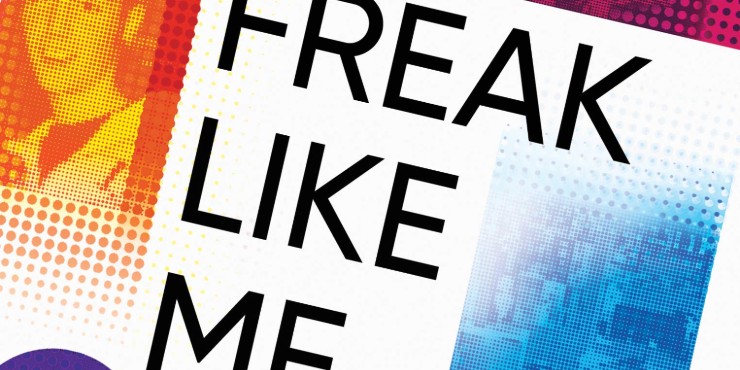Review: Freak Like Me, by Malcolm McLean

Everyone says that they grew up during the best time for music and popular culture, but I strongly feel that things just haven’t been the same since the 90s ended - or, more accurately, since 9/11, when the world suddenly seemed a lot more dangerous and fragile. Of course the 90s had terrorism and bad news, but a combination of them being on a much smaller scale, and my being less aware of them because of my age (I turned 13 a month after 9/11) meant that I’ve come to think of the 90s as a more innocent and joyous time - and that the catchy, cheesy, manufactured pop music I grew up with died with the decade/century/millennium.
Freak Like Me, Malcolm McLean’s memoir of following some of the biggest names in pop towards the end of the 90s, is like slipping into a warm bath of memories of watching my favourite groups on Top of the Pops, Live & Kicking and SM:TV/CD:UK, taping songs off the radio and reading Smash Hits. It also reminded me of feeling safe and secure, and felt like affirmation that I was there. I haven’t come across any book, TV show or website that has taken me back quite so completely.
Although my three main obsessions (Boyzone, Steps, and Five) were different from McLean’s (Eternal, Spice Girls and B*Witched) I remembered very clearly a lot of the events and song/album campaigns he recalled, and it was so interesting to read about how he found out where they would be so he could be in the audience and/or meet them. As I’m a few years younger, I didn’t have the opportunity to see any 90s groups in the flesh (on the plus side, I can say the first gig I went to entirely voluntarily was HIM, which isn’t embarrassing!) and always did wonder how people got to meet pop stars (ringing airlines was surprisingly effective in those less security-conscious days!). He’d mention a certain edition of a programme and who was on it with which songs, and I’d be like ‘OMG I remember seeing that!’. Reading this book felt a lot like exchanging memories with a friend.
McLean’s account also supports my feeling that the 90s ended in 2001. It was around this time, he writes, that a lot of the cheesy pop bands split up or were dropped by their record labels, and the charts came to be dominated by slicker, cooler R&B and rap. To be sure, some artists survived this change in the public’s music tastes by pivoting towards a more ‘grown-up’ sound and image - Britney and Christina spring to mind - but there was only so much Steps and B*Witched could do, really.
I’d also agree with McLean that ITV’s Popstars hastened the era’s demise, not only because it revealed the previously hidden ‘ingredients and method’ behind a manufactured group, but also because Hear’Say’s career was so topsy-turvy - unlike other groups of their kind, they started at the top, got over-exposed too quickly, and had nowhere to go but down after that. Manufactured groups did continue - often selected by the public themselves via The X Factor - but again, with some exceptions, I think the music they released had more of an ‘edge’ to it that of their 90s counterparts.
Quite aside from all that, as McLean points out himself, it’s difficult to imagine he and his friends would have been able to crash events - they got into the BRIT Awards with fake passes! More than once! - after the huge security crackdowns sparked by 9/11.
McLean doesn’t sugar-coat the bad things about the 90s, though - homophobia being a huge problem he personally faced. It’s important to remember that it really wasn’t that long ago that the word ‘gay’ was used as an insult, and careers were at risk for anyone being ‘outed’ by the tabloids. He suffered bullying at school, where Section 28 meant he received no help from his teachers, and abuse and assault out in public.
Another bad thing that comes up is the cruelty of the music industry. McLean charts pop stars’ highs and lows as they’re disposed of when they’re no longer making money, or built up, then torn down, by the press. A particular example is Geri Halliwell, who went from being outgoing and friendly with her McLean and her other fans, to a withdrawn, pale figure who no longer wanted to be famous. He also witnessed Britney’s ‘people’s’ control over her, foreshadowing developments beyond the scope of the book. We watch him realise that he and his friends are infringing on the celebrities’ privacy, even though that was far from their intent, and that the stars are exhausted from having to be ‘on’ all the time for their fans.
I really enjoyed Freak Like Me. McLean strikes exactly the right balance between the good and bad of the 90s, and brings the era back to life just as I remember it. His snarky humour made me snort out loud at times (why did the National Lottery draw require a whole 45-minute variety show?), my heart warmed when he found friends who shared his obsessions, and his anecdotes were so, so relatable (retreating into music because you hated school and had few friends! The pain of being on holiday when your favourite group was appearing on all the TV shows! The politics of blank videotapes within families!). I would love to see more books like this.